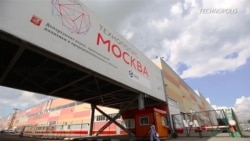Russian authorities are describing the country's economic downturn and Western sanctions against it as opportunities to reduce its reliance on energy exports by developing domestic, innovative industries. To spur the growth of high-tech industries, one technology park developed by Moscow city authorities is attracting Western companies that have their eyes on the Russian market.
The Moscow city government converted a defunct, Soviet-era car factory into Technopolis, a technology park attracting many high-tech companies that want to get a foothold in the Russian market.
Technopolis CEO Igor Ischenko said foreign companies are lining up to invest.
“That’s not, to be honest, not only because we are the best. We’re only one, maybe lonely one, in this kind of scale, in this kind of greatness, I would say; but, I strongly believe that this is only the start point for development of new solution in terms of technical zone, special economical zone, to be prepared to welcome high technology,” said Ischenko.
Ischenko said the number of occupants this year will reach 50 companies, nearly double what it is now, but about half of what was originally expected.
Western sanctions against Russia over Ukraine have caused some companies to back off investments and joint ventures.
Elina Belevskaya is head of public relations for Holding Company Composite (HCC), a state-owned firm producing advanced materials like carbon fiber.
“When we were in talks with Dow Chemical and Dow Aksa we counted on opening doors to access the world auto industry and, more concretely, the U.S Ford Motor company, as our company is still rather new and we cannot do it on our own. In Russia, it is not that easy to be heard by the auto giants. The weight of Dow Chemical would have allowed us to offer our production in the U.S market; but, it was impossible to do as our cooperation was frozen,” said Belevskaya.
More fundamental problems include accessing raw materials needed for production and developing markets in Russia.
HCC's affiliate company, Nanotechnology Center for Composites, maintains cooperation with Dow Aksa but still has to rely on Europe for its supplies and customers.
The Russian authorities' push for developing and diversifying local industries raises hopes that could change, says technical director Peter Molnar.
“This situation is somehow developing the local market and the local production. And we hope that we can be a part of this local production. And, yeah, I hope that we can show that it is possible to produce here, even high-end products and products which are quite new and innovative,” said Molnar.
Technopolis CEO Ischenko said there are plans to open an even larger industrial park using Technopolis management.
Underscoring the economic uncertainty, however, he acknowledged there are concerns the tax breaks, free power and water that Moscow provides the high-tech park could be reduced if city budgets continue to suffer.










